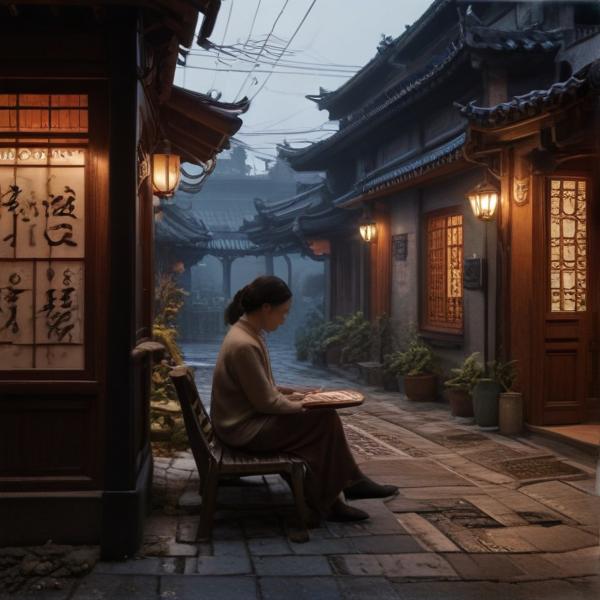基本信息 (Basic Information)
含义与用法 (Meanings & Usage)
中文核心释义 (Core Chinese Meaning): 戏剧,戏曲,戏文等用来表演故事的艺术形式;猛烈,激烈。
英文核心释义 (Core English Meaning): drama, play, theatre; also used to mean intense or fierce.
象形意义 / 为何这么写 (Pictographic Meaning / Writing Rationale)
文言文释义 (Classical Chinese Meaning)
“剧”在文言文中多作激烈、猛烈解,后用为戏剧表演,与现代意义相近。'剧' in Classical Chinese often meant intense or severe, later extended to refer to theatrical performances, similar to the modern meaning.
深入学习 (In-depth Study)
字源故事 (Origin Story)
字形演变 (Character Evolution)
常用词语和例句 (Common Words & Examples)
戏剧 (drama; play; theatre)
他非常喜欢看中国传统戏剧。
Eng: He really enjoys watching traditional Chinese drama.
电视剧 (TV drama; television series)
这部电视剧很受年轻人欢迎。
Eng: This TV series is very popular among young people.
剧烈 (intense; severe; violent)
他感到剧烈的疼痛。
Eng: He felt intense pain.
相关成语 (Related Idioms)
悲欢离合,剧变无常
Meaning: Joy and sorrow come and go; dramatic changes are unpredictable.
多语言翻译 (核心释义) (Translations (Core Meaning))
- French: drame, pièce de théâtre
- German: Drama, Theaterstück
- Spanish: drama, obra de teatro
- Italian: dramma, spettacolo teatrale
- Portuguese: drama, peça de teatro
- Russian: драма, спектакль
- Arabic: مسرحية، دراما
- Persian: نمایش، درام
- Dutch: drama, toneelstuk
- Polish: dramat, sztuka teatralna
- Vietnamese: kịch, vở kịch
- Ukrainian: драма, театральна вистава
视频学习资源 (Video Learning Resources)
通过以下链接在热门视频网站搜索 "剧" 的更多讲解:
Search for more explanations of "剧" on popular video sites:
- 在 Bilibili.com 搜索 "剧 字源 说文解字" (Search on Bilibili)
- 在 YouTube.com 搜索 "剧 character origin etymology" (Search on YouTube)
网络参考 (Web References for "剧") ()
网络内容摘要 (Web Content Summary):
剧,常用读音为 jù,其核心含义为“戏剧、剧烈、表演或戏台上的活动”。剧 (jù) commonly means "drama," "play," or "intense/severe" in Chinese; it is associated with theatrical performance or something intense.
-
象形起源与文化背景:“剧”字的古文字形来自“豦”,原指猛兽(如老虎、野猪),含有激烈、猛烈的意思,后来引申为“剧烈”和“戏剧”。 Etymological origin: The ancient form relates to fierce animals (tiger, wild boar) representing something violent or intense, later extended to mean "drama" or "performance."
-
特别用法与易混点:“剧”在历史上也作为姓氏出现,古音为 jī。但在现代生活中,“剧”字姓氏和常用词语都习惯读作 jù,需要注意区分。 Special usage and pronunciation: As a surname, it was historically pronounced "jī," but nowadays is generally pronounced "jù" in all contexts. Learners should be aware of this.
-
常用词语和成语: 剧本(script),电视剧(TV series),悲剧(tragedy),喜剧(comedy);成语如“悲喜剧中”。 Common words and phrases: jùběn (script), diànshìjù (TV series), bēijù (tragedy), xǐjù (comedy); idioms often relate to dramatic events.
总体来说,“剧”字包含“激烈、表演”的文化与形象,非常适用于表示文艺、感情波澜等主题。 In summary, the character "剧" conveys both "intensity" and "performance," making it central in cultural and artistic contexts.
【剧,劇】的甲骨文金文篆文字形演变含义 - 甲骨文研究网 甲骨文密码字典 在线甲骨文字典研究 - 甲骨文研究网 甲骨文密码字典 在线甲骨文字典 ...
汉字的来历和演变(說文解字 篆體字)(六書通 篆體字) 甲骨文密码【甲骨密码】【其他解读】豦,表示老虎、毫猪等猛兽。 ... 剧,篆文=(豦,猛 . rss. ... 汉字甲骨文破译字典》一书中,破解的古诗、竹简等古文作品收录在《新编甲骨文破译案例解析 ...
剧(汉语文字)_百度百科
jī :这是"剧"字作为姓氏时的特殊读音。在《正韵》等典籍中有特别注释:"剧,姓,竭戟切,音屐,非渠力切。"即"剧"作为姓氏时,应读作jī,而非常见的jù。然而,现代人多读作jù,包括剧氏族人自己,这可能是由于音讹所致。
更多图片 (剧 More Images) ()
